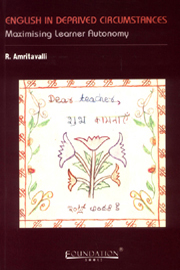4 - Listening, reading, writing
Published online by Cambridge University Press: 26 October 2011
Summary
An Examination Again and the Assessment of Acquisition
When the new academic year began in June 1999, my visits to Ananda Bharati became less regular. The CIEFL was involved in a project with the Andhra Pradesh Residential Educational Institutions Society, which required the preparation of material and the training of teachers at workshops at CIEFL, as well as school visits. The “class VII” group now consisted of four girls: Sudha and Rajeshwari from the older group, and two newcomers, Sumati and Sharada, who had moved up from the less advanced group of children. (Another girl, Anuradha, moved up, but fell back into the beginner's group as she dropped out for about 3-4 months. Recall that Yamini, in the meanwhile, had passed the Class VII examination.) During this time, work on whole language and story-listening done by a student at CIEFL suggested listening to stories on cassette as a viable activity; accordingly, an audio story ‘The Monkey King’ was played to the group, which they listened to while following the text.
A report, ‘School for deprived children’ by W. Chandrakant, that appeared in The Hindu at this time (Monday, 6 September 1999) begins with a reference to the children's level of comfort in English: “A simple expression like ‘Oh my God!’ coming from someone need not surprise anyone. But when it comes from a child labourer slogging in houses by cleaning dishes and washing clothes, won't you be surprised?” […]
- Type
- Chapter
- Information
- English in Deprived CircumstancesMaximising Learner Autonomy, pp. 49 - 67Publisher: Foundation BooksPrint publication year: 2007

